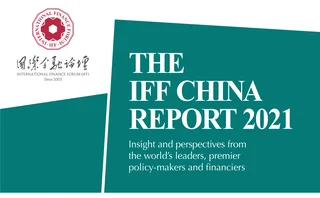
Into the green


In September 2020, at the UN General Assembly, President Xi Jinping pledged that China would peak its carbon emissions by 2030 and reach carbon neutrality by 2060. China also showcased its determination to promote green and low-carbon development in recently published proposals for its 14th Five Year Plan (2021–25) for National Economic and Social Development and Long-Range Objectives Through the Year 2035.
Green finance, which can play an essential role, has already made much progress in this area. China has developed national taxonomies for green financial assets and introduced regulatory and incentive policies, such as environmental disclosure requirements, and inclusion of green assets as eligible collaterals. A wide range of green products has emerged, from green loans and green bonds to green insurance and green funds. Of course, more must be done to further strengthen the green finance system in China, especially through international exchange and co-operation.

Deutsche Gesellschaft für Internationale Zusammenarbeit (GIZ) is a development agency and the premier institution engaged by the German government to foster sustainable development worldwide. GIZ recently advised the German Federal Ministry of Finance by analysing the prerequisites for the issuance of green or sustainable German federal securities. The scope of this assignment included the assessment of relevant economic factors and overarching framework conditions, as well as relevant national, regional and international policies, principles and best practices.
An important building block in Germany’s sustainable finance strategy involved issuing green federal securities. The €6.5 billion German sovereign green bond was launched on September 3, 2020. It was five times oversubscribed, with an order book exceeding €33 billion. The green bond, with a maturity of 10 years and coupon of 0%, was priced 1 basis point below the ‘conventional’ 10-year German federal government bond, with a yield equating to -0.46%.
This landmark transaction in sovereign green bond markets is significant for two reasons. First, the format. The German concept of ‘green twin bonds’ allows green bond investors to swap their holdings with a conventional German government bond with the same maturity and coupon whenever they want. This twin bond mechanism is an important market innovation: it increases the marketability and transparency of green bonds, ensures that the issuance of green bonds does not negatively affect the overall liquidity of the government bond market, and provides an interest rate benchmark for the euro green finance market. Germany plans to build a full yield curve and, to this end, a five-year maturity transaction was launched in 2020. This gives investors more options to ‘greenify’ their fixed income portfolio at several different points along the yield curve.
GIZ sees great potential in green finance co-operation between Germany and China, and the EU and China
The second reason is eligible expenditures. Climate change is a global challenge, requiring strong collaborative efforts and technological innovation. The German government decided to include expenditures related to international co-operation earmarked for combating climate change, as well as in research and development. Both categories are, in the view of GIZ, within the mandate of governments. We conclude there are several benefits for a government entering the sovereign green bond market: it demonstrates the government’s support for sustainable development as well as its determination to combat climate change; it sets a benchmark for green bond products in the market; it provides a good example for other potential green issuers; and it increases the awareness of the general public regarding green finance.
The financial market never lacks innovation, but not all innovations are equal. Green finance itself represents an innovative investment philosophy: to put the power of capital at the service of the people and the planet. GIZ sees great potential in green finance co-operation between Germany and China, and the European Union and China. On behalf of the German government, GIZ works with the Chinese government to foster green and sustainable finance in China-Germany relations. Through the European Council presidency, Germany is also fostering green finance in EU–China relations. On behalf of the European Commission, GIZ supports the EU’s Platform on Sustainable Finance, a key driver to implement and co-ordinate the international outreach of the European Commission’s Sustainable Finance Action Plan. China is a founding member of this platform and one of its most important partners.
GIZ also works with other emerging markets to enhance sustainable finance actions. In Brazil, it works with the ministry of finance to improve regulations to scale up green financial markets, for example, by introducing environmental and social standards in the banking sector. It also works with the government of Vietnam to implement its national green finance strategy, which promotes green banking and capital markets. In addition, GIZ launched a pilot to support a green recovery for the Association of Southeast Asian Nations (ASEAN), by translating the instruments of the EU Sustainable Finance Plan to the local context of ASEAN countries.
Only users who have a paid subscription or are part of a corporate subscription are able to print or copy content.
To access these options, along with all other subscription benefits, please contact info@centralbanking.com or view our subscription options here: http://subscriptions.centralbanking.com/subscribe
You are currently unable to print this content. Please contact info@centralbanking.com to find out more.
You are currently unable to copy this content. Please contact info@centralbanking.com to find out more.
Copyright Infopro Digital Limited. All rights reserved.
As outlined in our terms and conditions, https://www.infopro-digital.com/terms-and-conditions/subscriptions/ (point 2.4), printing is limited to a single copy.
If you would like to purchase additional rights please email info@centralbanking.com
Copyright Infopro Digital Limited. All rights reserved.
You may share this content using our article tools. As outlined in our terms and conditions, https://www.infopro-digital.com/terms-and-conditions/subscriptions/ (clause 2.4), an Authorised User may only make one copy of the materials for their own personal use. You must also comply with the restrictions in clause 2.5.
If you would like to purchase additional rights please email info@centralbanking.com





